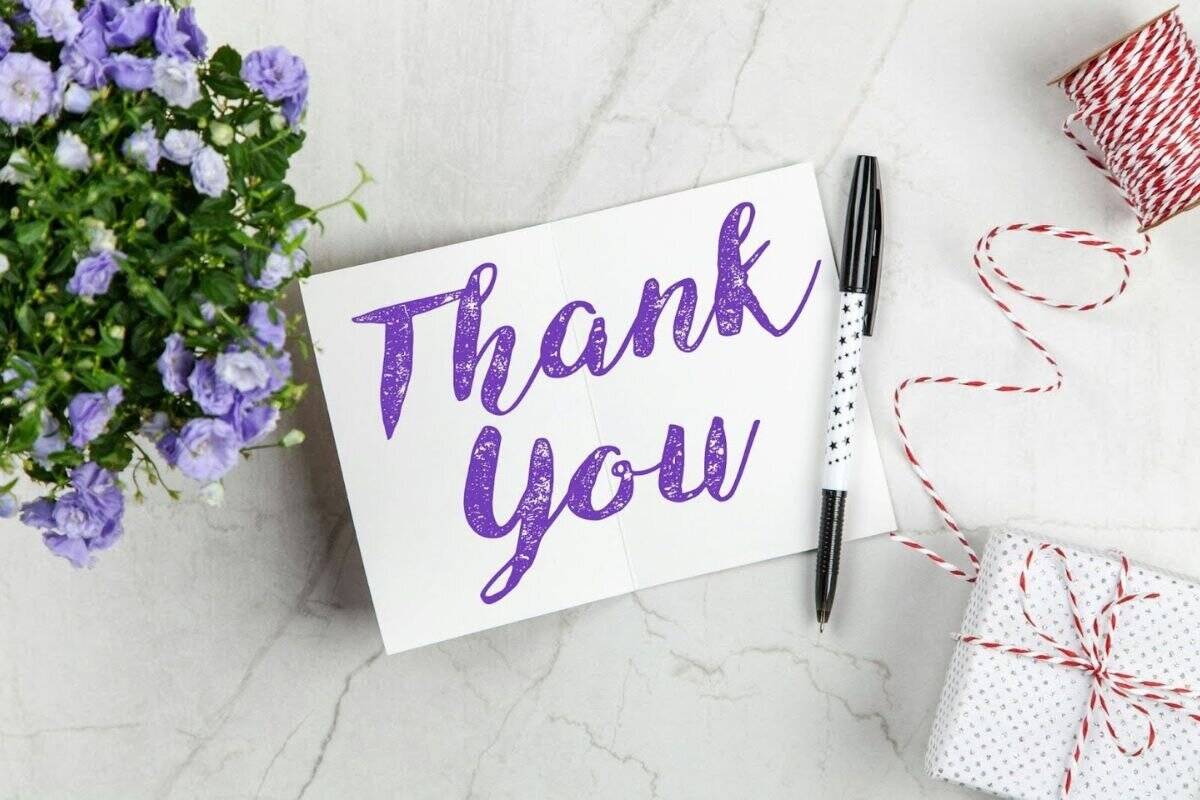Showing gratitude costs nothing, but it means everything.
Think about the last time a coworker swooped in to help you wrap up a late-night project. Or a friend who did some not-so-fun errands for you.
So why not express your thanks through an appreciation message?
It can be in a quick thank you email, a handwritten note, a short text, or even a kind social media comment.
Whether you’re planning to write one for a friend, a loved one, a mentor, or a colleague, your message doesn’t have to be over-poetic. It just needs to be genuine.
In this article, we’ll help make your appreciation thank you message count.
Learn how to write one that sets the right tone, along with examples you can reference when making your own.
Key Takeaways
- An appreciation message is a thoughtful note that expresses genuine thanks. You can send one to colleagues, friends, mentors, family members, clients, or anyone who has made a positive impact.
- To write a successful appreciation message, start with a clear reason for your thanks, include a specific detail or example, and close with a warm, sincere note. Keep it honest, personal, and suited to the relationship.
- Setting the tone is vital when making your message, so match your tone to the situation, whether more formal for professional contacts or more casual or warm for friends and loved ones. Regardless, aim for clarity and authenticity every time.
What Is an Appreciation Message?
Expressing gratitude is a good deed, and there’s science behind it, too.
The brain releases feel-good chemicals like dopamine that can boost our mood and overall happiness.
An appreciation message is often short and sweet but goes a long way toward making someone feel valued.


Never Worry About AI Detecting Your Texts Again. Undetectable AI Can Help You:
- Make your AI assisted writing appear human-like.
- Bypass all major AI detection tools with just one click.
- Use AI safely and confidently in school and work.
These messages express genuine gratitude. In them, you mention what the person did, how it helped you, and how it made you feel.
Even though these messages are great ways to show appreciation, many of us still hesitate to express gratitude. Research shows that people want to do so, but they often don’t.
There’s a tendency for us to underestimate how positive it would make the person feel and overestimate how awkward it’ll be, even if it really won’t, in most cases.
With that, the focus should be more on crafting the appropriate thank you message that delivers it in the right way.
When to Send an Appreciation Message
While saying thank you is easy, the timing and tone make all the difference.
A professional thank you message for appreciation isn’t the same as sending a quick one to your bestie.
Here are some moments that call for a thoughtful appreciation message:
- After a colleague helps you meet a tough deadline
- When your manager gives you helpful feedback or recognition
- Following a successful event or team win at work
- After receiving guidance or support from a teacher or mentor
- To thank a client for their loyalty or referral
- After a friend checks in on you or does something nice
- To your parents or family members for everyday support
- When a customer gives a review, shares feedback, or stays loyal
- To your teacher after finishing a school year or a big project
- Anytime someone goes out of their way, big or small, to help
You don’t have to wait for a special occasion. A message at the ideal moment can mean a lot.
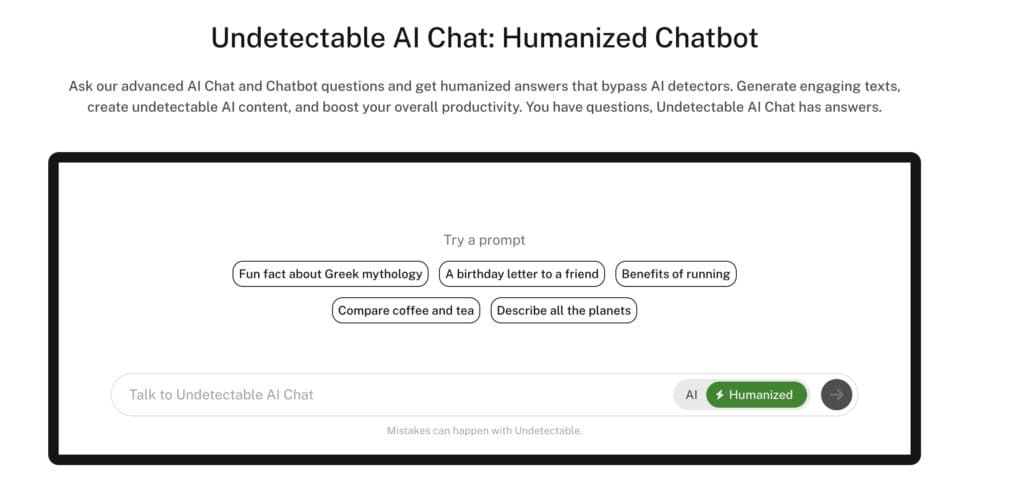
If you’re unsure what to say or how to match the tone to the situation, you can always ask Undetectable’s AI Chat tool to give you personalized suggestions based on your needs.
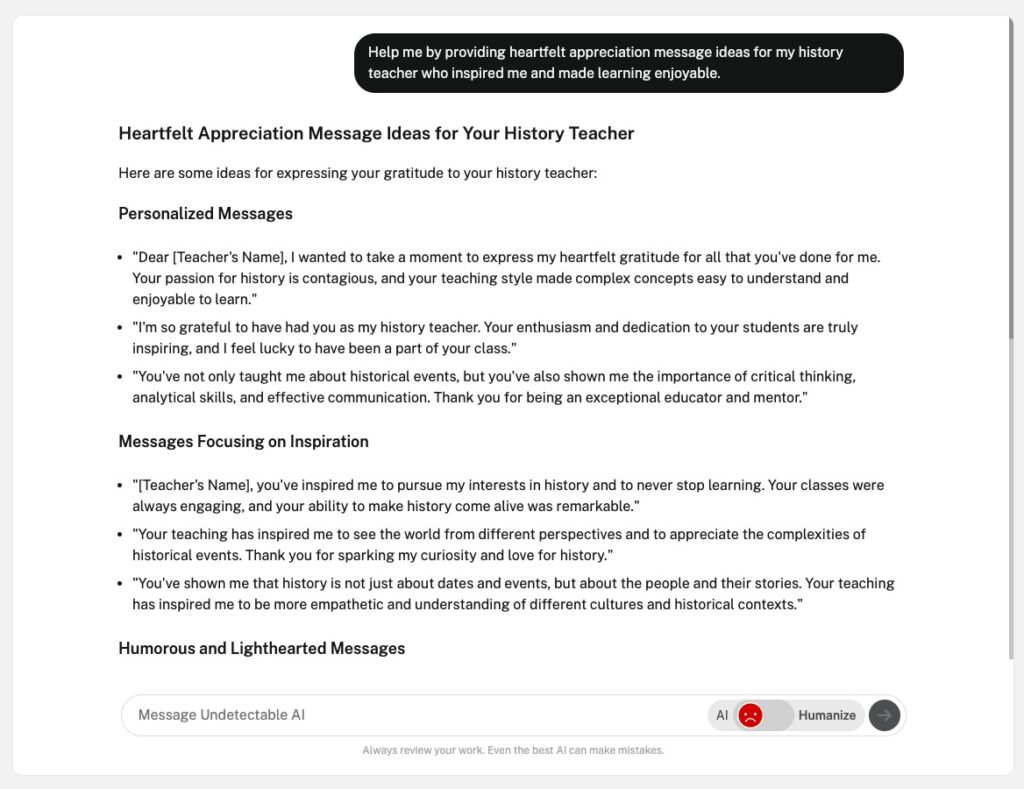
AI Chat gives you the best ideas through gentle guidance while making sure your message stays personal and true to your voice.
How to Write an Appreciation Message (Step-by-Step)
Ready to write your thanks, but can’t seem to get the words out?
We get what might be at stake, especially when you’re writing a message to a trusted business client or when you’re typing an email to a teacher you truly look up to.
To guide you, here are steps to write an appreciation message that feels real and not just copied and pasted:
- Start with a greeting: Address the person by name to add a personal touch and show that you’re speaking directly to them. “Hey Sarah” or “Dear Mr. Lopez” can work depending on the relationship you have with them.
- Clearly say thank you: Next is to let them know why you’re writing. Get right to the point with a simple line like “Thank you for your help during yesterday’s meeting.”
- Mention what you’re grateful for: It’s best to be specific here. Describe what they did and why it meant something to you. This shows that you noticed the effort and truly appreciated it.
- Share the impact: Briefly say how it helped you or made you feel. You can say, “Your feedback gave me the confidence to move forward with the decision.”
- End with warmth: Close with something sincere. It could be “Wishing you all the best” or “Looking forward to working with you again.”
Don’t worry about the length of your appreciation message. It’s generally better to be short and sincere than overly long and dramatic.
For example, a thank you after a job interview is expected to be around 250-300 words, which is long enough to show appreciation and express interest while staying professional and respecting the reader’s time.
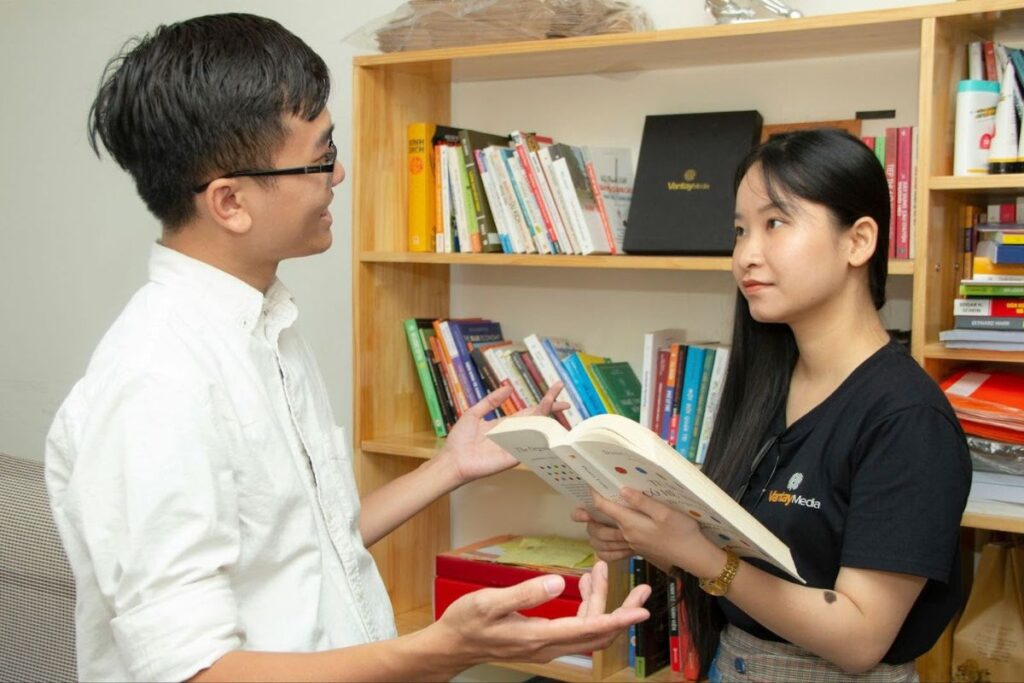
Tone Tips for Appreciation Messages
The tone of your appreciation message should be able to set the mood and instantly give away your intention.
Essentially, the tone of the message you write for your boss won’t be the same as one sent to your colleague.
The key here is to know who you’re talking to in the message and why you’re thanking them.
Take note of these tips to set the proper tone for your appreciation message:
- Match the relationship: Consider your connection with the person. A teacher appreciation message should sound professional, while a note to your close friend can be kept relaxed.
- Know when to be formal or casual: For work, clients, or teachers, stick to more polished wording. For friends or loved ones, a casual tone feels more real and heartfelt.
- Keep it sincere, not scripted: Avoid sounding over-rehearsed. Say what you actually mean, and fit the tone to the proper context. Think about how “I would like to extend my sincere gratitude” sounds completely different from “I really appreciated your help.”
- Use natural language: Write like you speak. Whichever tone you use, just make sure your message always feels like you. It’ll help the message resonate better and make it easy for the reader to hear your voice.
- Don’t overdo it: Gratitude is great, but too much of it can come off as insincere. Keep your tone appreciative but still grounded.
Let the tone support your message and not distract from it. We also advise reading it aloud first.
If it sounds like something you’d actually say, then you’re on track.
Appreciation Message Examples
Here are appreciation message examples you can use as a reference. As mentioned, the tone and format of your message depend on the situation and who you’re addressing.
For Work/Colleagues
Expressing gratitude strengthens relationships at work. Aim for a professional and respectful tone.
To a Boss
Dear [Manager’s Name],
Thank you for your guidance and support during last week’s presentation. Your feedback helped me feel more confident, and your trust gave me the space to take the lead. I’ve learned a lot, and I appreciate the opportunity.
Best,
[Your Name]
To a Colleague
Hi [Coworker’s Name],
I just wanted to say thanks for your help with the monthly report. I know you had a lot on your plate, but you still took the time to check my numbers and answer my questions. It really made a difference.
Thanks again,
[Your Name]
For Teachers/Mentors
A teacher or mentor can leave a lasting impact. It only makes sense to show how a person of this value has shaped your path.
To a Teacher
Dear [Teacher’s Name],
Thank you for being patient and encouraging this semester. Your passion for the subject made every class more engaging. I’m especially grateful for how you helped me during your office hours when I was struggling with the material.
Sincerely,
[Your Name]
To a Mentor
Hi Professor [Mentor’s Name],
I wanted to thank you for the advice and support you gave me during my final year. Your insights on research and career direction were incredibly helpful. I genuinely appreciate your time and belief in my potential.
Warm regards,
[Your Name]
For Friends/Family
Giving thanks doesn’t have to be formal all the time. Being casual is the best way to approach loved ones. These messages are also often shorter and direct to the point.
To a Casual Friend
Hey [Friend’s Name],
Thanks for checking in last week. It really meant a lot. I didn’t realize how much I needed a friendly voice until you called. Hope I can return the favor sometime.
To a Best Friend
Hi [Best Friend’s Name],
Just wanted to say thanks for always being there, whether we’re celebrating wins or picking me up on bad days. You’re seriously the best.
To Family
Hi Aunt [Name],
Thank you so much for your kind words and thoughtful gift. I’ve always appreciated your warmth and support, even from miles away.
For Clients/Customers
Professional appreciation messages build trust. Thank a client for their continued business or a customer for their recent purchase.
To a Business Client
Hi [Client’s Name],
Thank you for your continued partnership with [Your Company Name]. Your feedback and collaboration have helped us improve and deliver better results. We truly value your trust in us.
Warm regards,
[Your Name]
[Your Position]
To a Customer
Hi [Customer’s Name],
Thank you for choosing us! We’re grateful for your support and hope you’re loving your new [product/service]. If there’s anything we can help with, feel free to reach out.
Best,
[Your Name]
[Company Name]

Using AI to Write Appreciation Messages
Nowadays, AI is advanced enough to help people sharpen their writing skills, including when writing appreciation messages.
With AI, you can work on expressing yourself more clearly and confidently.
Undetectable AI offers tools that support your writing without taking away your voice.
That way, you’re still in control—you just get a boost where needed.
Here’s how Undetectable can support your writing journey:
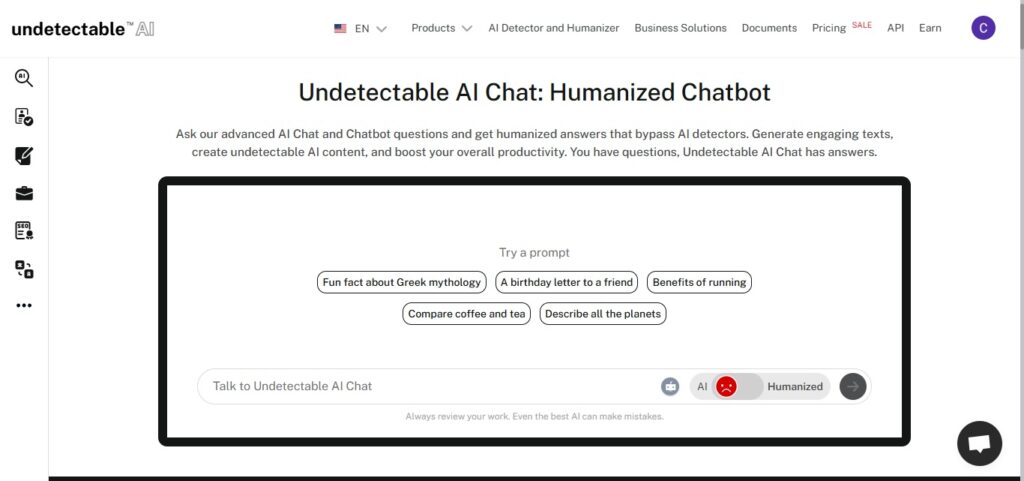
- AI Chat: Stuck on what to say? Use the chat to get ideas that match your situation. You can also get feedback to improve your message before sending it.
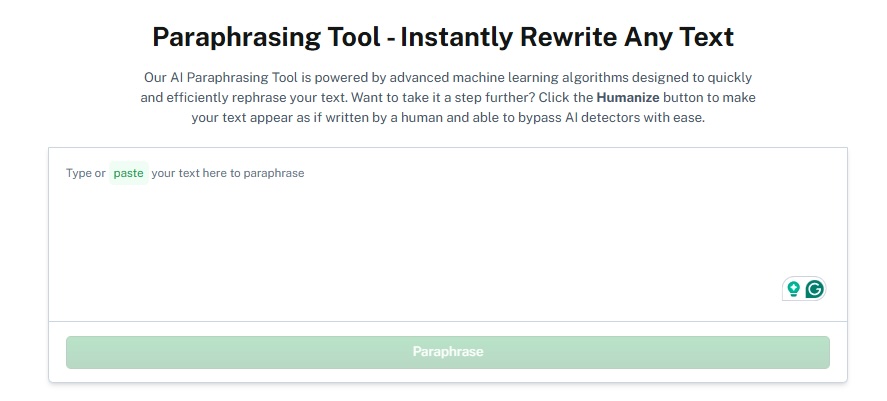
- AI Paraphraser: Tired of saying “thank you” the same way over and over again? Use the paraphraser to get fresh sentence variations while keeping your meaning.
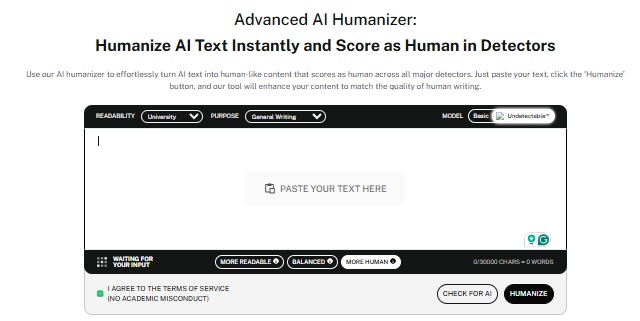
- AI Humanizer: Improve the tone and flow of your message. This is especially useful after generating a draft with the help of AI.
AI tools should support your voice, not drown it out. Use them thoughtfully to shape what you already want to say.
Keep your message sincere, and let AI help you say it better.
Check out our AI Detector and Humanizer right in the widget below!
FAQs About Appreciation Messages
Should I write an appreciation message by email or by hand?
The method you use to write an appreciation message depends on the situation and your relationship with the person.
For instance, if they’re a boss from work, a trusted coworker, or anyone in a professional setting, an email is preferable.
Meanwhile, a handwritten note can feel more thoughtful when writing to a close friend or family member. Ultimately, it’s the sincerity of the message that matters most.
How long should an appreciation message be?
Your appreciation message should be concise yet meaningful in most cases. A short paragraph, around 100 to 200 words, is often enough for casual or professional thank-yous.
For more formal occasions, like thanking a job interviewer or writing a letter to a mentor, a letter format between 250 and 300 words may be more appropriate.
Kind Words Are Just a Message Away
Go ahead and take those few minutes to express gratitude.
Your appreciation message matters more than you might think.
And if you need a good starting point or if your work needs a bit more polish, Undetectable AI can help give you the confidence to write with clarity and heart.
Say what you feel and then use Undetectable’s tools to make sure it lands just right.
